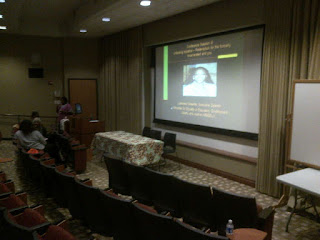Latreese Cooke and MEELJ
Kola's lecture at Emory was part of a larger National Herstory Conference of three Black women lecturers being featured at the Whitehead Biomedical Auditorium at Emory University. The crowd was relatively small but greatly invested in the issues brought forth by the speakers. When I entered the auditorium, second speaker, Latreese Cooke, a Houston-based advocate who helps first time offenders or formerly-convicted people understand their responsibilities in receiving proper representation for their rights. She discussed the trials and tribulations of running her non-profit,
MEELJ, as well as awnser questions regarding legal uncertainties with some audience member's relatives.
One topic she covered I hit myself for never even considering, like the emotional and mental condition of a person leaving prison 17 years after he goes in at age 16. He's learned how to be more violent, not just by inmates but by guards. He's spent 17 years under a strict routine that removed any sense of privacy we take for granted on the outside. His family welcomes him back and addresses him if he had not been in hell for 17 years. 17 years is a big chunk that you can't pretend is not missing. To disregard his mental state can be very harmful to him. If not dealt with appropriately he can react negatively. If we provide soldiers who've seen action mental health services, convicts who've served time need it as much.
I also learned some random facts:
- 95% of Black and hispanic youths 16-18 are in Federal Prison.
- An ex-convict can vote in an election if s/he's completed parole, completed their sentence and has successfully re-entered society.
- A person who worked in a crack warehouse has warehouse/assembly line experience.
- Texaco Execs would never promote "Jigaboos" to corporate positions
- The Houston Federal Courts Sentenced 200 Young offenders to 120 months in 24 hours.
- There was no "youth prison crisis" in Texas until a white girl received a 10 year sentence for murder in 2006.
- Parades and Marches helps media outlets get ratings more than they help the people they supposedly support. (Is Troy Davis alive?)
And the most important fact: Courts are not willing to sentence black and hispanic offenders anywhere below 10 years, while their white counterparts get misdemeanor charges and community service.
Ms. Cooke does not help those who bid their time on the inside until they can commit more crime. She helps those who made made a mistake, survived among the truly incorrigible and yet still work hard to be part of the society that threw them away so easily.
There's nothing we can do to change this system, but we can challenge it. Sometimes it helps by offering access to someone who has no access to it. Or just providing legal services to someone in need of it but with no clue where to find start looking for it. In response to an audience member's question, it didn't mater whether your lawyer was court ordered, it is the family or individual's responsibility to seek information that will help their loved one. It may not get them acquitted, but it will get them the right sentence that truly fits their crime, and lessens their time.

Update: Since I returned from my trip, further online research revealed websites, mostly conservative or republican, trying to expose Ms. Cooke' alleged criminal background. What these sites refer to as "dark secrets" were not so secret to Ms. Cooke, as she honestly shared them with us with sincere and unapologetic honesty. What this woman is doing is a serious threat to those in power. And like those she helps to re-enter society, these people are using political tactics to destroy her reputation.
-_-'





















